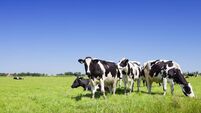Sat, 27 May, 2023 - 08:00
Kieran Coughlan
The deadline is nearly upon us for submitting applications for Department of Agriculture farm payments this year. Next Monday, May 29, marks the date, and after this penalties are applied in a linear fashion.
Other key deadlines include:
Already a subscriber? Sign in
You have reached your article limit.
Subscribe to access all of the Irish Examiner.
Annual €130 €80
Best value
Monthly €12€6 / month
Introductory offers for new customers. Annual billed once for first year. Renews at €130. Monthly initial discount (first 3 months) billed monthly, then €12 a month. Ts&Cs apply.














